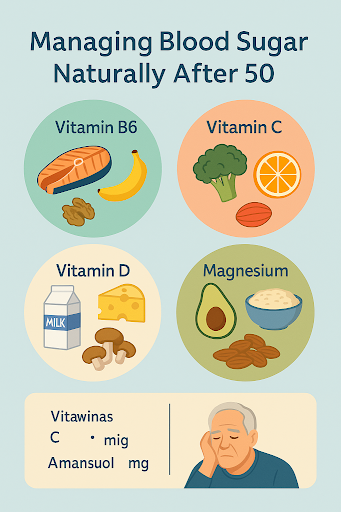Maintaining stable blood sugar levels is one of the most important aspects of healthy aging, especially for individuals over 50. With age, the body’s ability to regulate glucose may become less efficient, making it essential to adopt dietary habits that support balanced blood sugar and prevent complications such as type 2 diabetes, cardiovascular disease, and cognitive decline.
🧠 Understanding Blood Sugar and Its Role in the Body
Blood sugar (glucose) is the main source of energy for the body’s cells. It comes from the food we eat, especially carbohydrates. When we consume food, our body breaks it down into glucose, which then enters the bloodstream. Insulin, a hormone produced by the pancreas, helps transport glucose into the cells to be used for energy.
With aging, insulin sensitivity may decrease, leading to higher blood sugar levels and increased risk of insulin resistance. This makes it vital to manage glucose through proper nutrition.
🍽️ Key Dietary Strategies to Balance Blood Sugar
Here are some evidence-based dietary strategies that help regulate blood sugar naturally:
🥗 1. Choose Low-Glycemic Index Foods
Low-GI foods are digested slowly, causing a gradual rise in blood sugar. These include:
-
Legumes (lentils, chickpeas)
-
Whole grains (quinoa, oats)
-
Non-starchy vegetables (spinach, zucchini)
🥑 2. Focus on Fiber-Rich Meals
Fiber slows the absorption of sugar and improves gut health. Aim for:
-
Fruits with skin (apples, pears)
-
Leafy greens
-
Chia and flax seeds
🐟 3. Include Lean Proteins and Healthy Fats
Protein and fat slow glucose absorption and support satiety. Choose:
-
Fatty fish (salmon, sardines)
-
Nuts and seeds
-
Eggs and low-fat dairy

